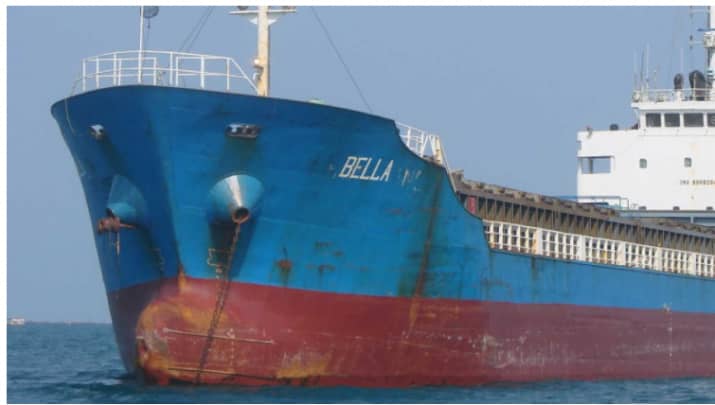Foreign-flagged oil tanker “Bella” carrying Iranian cargo bound for Venezuela.
Department of Justice
WASHINGTON — The Justice Department said Friday that federal agents seized a multimillion-dollar Iranian fuel shipment bound for Venezuela, in what it described as the largest-ever seizure of its kind.
The U.S., with the assistance of foreign partners, confiscated a total of 1.1 million barrels of petroleum from four foreign-flagged oil tankers, as Tehran and Caracas attempt to sidestep U.S. sanctions.
According to the Justice Department, after the seizure, “Iran’s navy forcibly boarded an unrelated ship in an apparent attempt to recover the seized petroleum but was unsuccessful.”
Footage released by Central Command, the U.S. military’s combatant command that oversees the wars in Iraq, Syria and Afghanistan, shows the failed Iranian operation.
“We are seeing more and more global shipping fleets avoiding the Iran-Venezuela trade due to our sanctions implementation and enforcement efforts,” State Department spokeswoman Morgan Ortagus wrote in a statement. “The United States remains committed to our maximum pressure campaigns against the Iranian and Maduro regimes,” she added.
In June, five Iranian oil tankers brought approximately 1.5 million barrels to gas-starved Venezuela, which was once a prominent fuel exporter. Gasoline is scarce in the South American nation due to a near-complete breakdown of the OPEC nation’s 1.3 million barrel-per-day refining network.
The two OPEC nations have previously helped each other in the face of U.S. sanctions. In 2010-2011, Venezuela’s state-run oil company, PDVSA, sent fuel to Iran, which was targeted by sanctions aimed at stifling its nuclear weapons program.
Venezuela — once the crown jewel of Latin America’s developing economy — has hit dire straits in recent years.
The price of oil, the country’s biggest export, has plummeted more than 60% since Nicolas Maduro succeeded dictator Hugo Chavez as Venezuela’s president in 2013. Earlier this year, U.S. crude prices briefly traded in negative territory for the first time ever as the coronavirus dented the global economic growth outlook.
The drop in oil prices coupled with a massive depreciation of the Venezuelan bolivar and sky-high inflation have left Venezuela scrambling for cash, food, medicine and other essentials.
— CNBC’s Fred Imbert contributed to this report.
